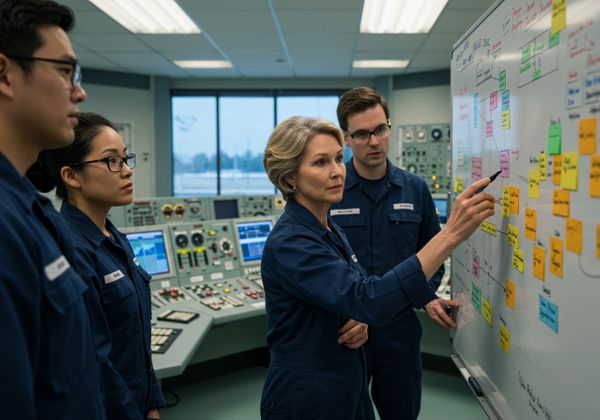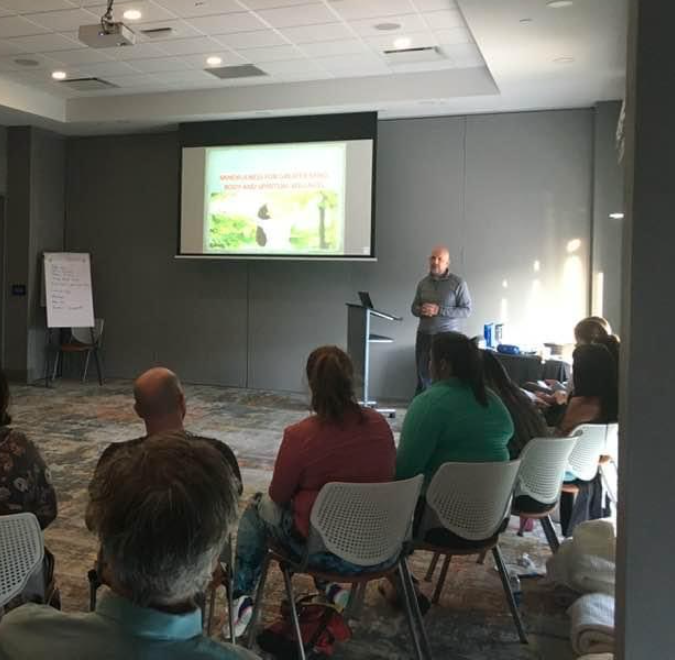Organizational Mindfulness
ALL-SECULAR, ALL-SCIENCE, PERFORMANCE-FOCUSED TRAINING
A NEW CATEGORY
OF MBI
Organizational Mindfulness is an entirely new category of mindfulness-based intervention (MBI). Just as MBSR was created as a therapeutic intervention for pain and stress management—and MBCT as a course for psychologists treating clients with cognitive behavioral therapy—Organizational Mindfulness was created from the ground up as an all-secular, all-science course to train mental and emotional skills for personal and organizational performance.
ORGANIZATIONAL
MINDFULNESS
Modern mindfulness was conceived to reduce stress, and has been conflated to denote any introspective, calm, or relaxing state. But through a scientific lens, mindfulness is a process of neural training that produces a series of now-predictable outcomes that develop critical mental and emotional skills. Organizational Mindfulness provides an understanding of the mechanics of each neural practice, their science-validated outcomes, and their application for more effective leadership and work.
"In a fast-paced world, increasing numbers of people are exhausted, overwhelmed, and disengaged. Our workplaces are full of burned-out leaders who report little bandwidth for big-picture thinking, for innovation, for truly understanding others, or building strong cultures. The skills to work with our minds, our emotions, and other people are essential – but rarely developed.” - Search Inside Yourself Leadership Institute (SIYLI)"
MENTAL TRAITS ARE
TRAINABLE SKILSS
Our best leaders inspire confidence and trust through traits like authenticity, presence, integrity, and compassion. Our best sales professionals quickly earn trust, establish rapport, and use intuition and influence to move a deal forward. Our best software engineers diminish distraction, engage deeply, and work in a state of creative flow.
Neuroscience has confirmed that these important traits (and many more) are, in fact, trainable mental skills that can be internalized and embodied through intentional neural exercises. Organizational Mindfulness is an expression of this new paradigm. It teaches the science and practical solutions for managing stress, sustaining attention, regulating emotions, navigating change and uncertainty, and resolving many otherwise intractable challenges.
"Organizational Mindfulness programs are designed to develop and strengthen modern work skills. They include solutions for reducing workplace stress, anxiety, distraction, conflict, toxicity, exhaustion, and burnout, while increasing awareness, attention control, human well-being, cognitive performance, and emotional intelligence."
THE ORGANIZATIONAL
MINDFULNESS COURSE
Organizational Mindfulness teaches next-generation mindfulness and other neural practices that are being defined by research into the mind, brain, and body. Science has proven the brain’s neuroplasticity—and that its function and structure can be intentionally shaped through mental practice, repetition, and intensity.
The course explores the underlying science, introduces a framework of neural practices, and applies their outcomes to resolve stress, restore attention control, navigate change and uncertainty, cultivate emotional intelligence, work effectively in teams, and build mental strength and resilience.
LEARNING PORTAL
AND NETWORK
Organizational Mindfulness includes 12 hours of live, instructor-led training, delivered online or onsite—supported by a companion Learning Portal integrated into the IOSM Global Network. The portal provides access to class recordings, slide decks, guided practices, additional self-paced learning, journaled research, expert video insights, and class-wide collaboration—along with network-wide access to curated content, members, and topical forums.
Plan Your Program
Each Course includes
- Twelve hours of interactive live training
- Led by expert instructors and delivered online or onsite.
Customize Your Schedule
- Four half-day live workshops (recommended)
- Two full-day live intensives
- Eight 90-minute live classes
- Eight 90-minute self-paced videos
Tailor Your Program
Courses are modular by design and can be tailored to your learning objectives, strategic focus, or scheduling needs—at no additional cost. This ensures the program you deliver aligns with your team, timeline, and goals.
For additional tools such as assessments, certification exams, and turnkey credentials, visit the Consider Your Options tab above. Please click here to email us with any questions you may have, or schedule a call using the button below.

Organizational Mindfulness Course Outline

Week 1. Neuroscience of Mindfulness
Our 2 million year old brain is programmed for automaticity, negative bias, and instant reactivity to threat. The mind is filled with transient mental phenomena that keep us lost in thought. This class explores the mechanics of the nonconscious brain, and how the process of mindfulness can intentionally shape it.
- How the brain has evolved to understand its world, and operate automatically, below the level of consciousness
- How mindfulness can intervene, switch us out of autopilot, and give us a process for intentional and objective choice
- Practices for noticing, decentering, present awareness, and observation

Week 2. Essential Principles and Practices
Mindfulness is a series of mental and emotional skills that can be intentionally applied to produce specific and predictable outcome. This class explores a framework of practice that maps mental attitudes and exercises to specific outcomes, that strengthen specific individual and organizational capabilities.
- The science and process of neural training
- To match mindfulness practices to specific outcomes and applications
- Mindfulness practices for awareness, attention, emotional imprinting, and insight

Week 3. Managing Stress, Anxiety, and Burnout
The perfect storm of a multi-year global pandemic has tipped decades of increasing overload, overwhelm, exhaustion and burnout into a full-blown mental health crisis at work. This class explores strategies and practices for effectively managing acute and chronic stress, anxiety, exhaustion, and burnout.
The evolutionary wiring and triggers that create and perpetuate acute and chronic stress
How mindfulness is applied to interrupt and reframe worry, rumination, self-critical and depressive thinking
Mindfulness practices that reframe and reduce stress, and increase mental and emotional resilience

Week 4. Increasing Focus and Attention Control
Information overload, workplace distraction, attention deficit and digital addiction are steadily eroding our attention spans and capabilities to do deep work. This class explores practices that physically strengthen brain networks associated with directing focus, sustaining concentration, and attention control.
The sources and science of overload, overwhelm, distraction, digital addiction and attention deficit trait
How to apply mindfulness to suppress distraction, and increase focus and attention control
Mindfulness practices that strengthen attention in the moment, and build attentional networks in the brain

Week 5. Navigating Change and Uncertainty
Our brains are wired to fear change and loathe uncertainty - yet we live in a world and workplace that is undergoing volatile and rapid disruption. How can we reconcile our resistance, to welcome and embrace change? This class explores mindfulness as a catalyst for individual and organizational change.
- Why and how change triggers fear that destroys concentration and hijacks our emotional state
- How mindfulness helps us understand, accept, and consciously navigate through continual change
- Mindfulness attitudes and practices for embracing impermanence and uncertainty

Week 6. Cultivating Emotional Intelligence
Science has proven that self-awareness, empathy, compassion and social grace aren't immutable traits, they are trainable skills that can be intentionally developed through neural exercise. This class examines the visceral power of social and emotional intelligence, and how to strengthen these foundational inter-personal capabilities.
- The framework and competencies that comprise emotional intelligence
- How mindfulness strengthens each foundational quality, in turn
- Mindfulness practices for self-awareness, emotional regulation, empathy and compassion

Week 7. Communication and Effective Teamwork
Chronic stress, anxiety, social and workplace conflict, remote and hybrid work, all have an impact on team dynamics, and can impair effective collaboration and teamwork. This class explores strategies and practices for greater positivity, creativity, and communications across the team.
- How to establish and work within an environment of psychological safety
- How to connect closely and cooperatively with others
- Mindfulness practices for acceptance, inclusion, and relationships

Week 8. Building Mental Strength, Grit & Resilience
The capabilities for managing stress, anxiety, distraction, conflict, exhaustion and burnout are critical professional competencies in a rapidly changing VUCA world. This class explores mindfulness practices that strengthen our mental and emotional skills, perseverance, and ability to bounce back.
- How to intentionally manage your attitudes and mindsets for positivity and personal growth
- How to create the energy, motivation and engagement for peak performance
- Mindful practices for self knowledge and purpose



